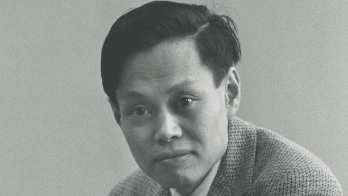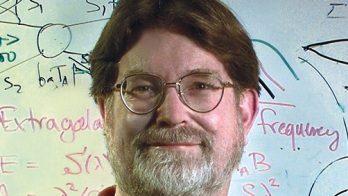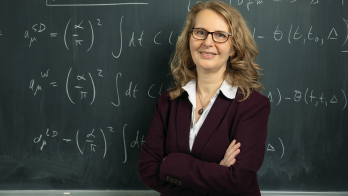A recent CERN Alumni Network event highlighted how skills developed in high-energy physics can be transferred to careers in the environmental industry, writes Craig Edwards.

CERN technologies and personnel make it a hub for so much more than exploring the fundamental laws of the universe. In an event organised by the CERN Alumni Relations team on 30 April, five CERN alumni who now work in the environmental industry discussed how their high-energy physics training helped them to get to where they are today.
One panellist, Zofia Rudjor, used to work on the ATLAS trigger system and the measurement of the Higgs-boson decays to tau leptons. Having spent 10 years at CERN, and with the discovery of the Higgs still fresh in the memory, she now works as a data scientist for the Norwegian Institute for Water Research (NIVA). “For my current role, a lot of the skills that I acquired at CERN, from solving complex problems to working with real-time data streams, turned out to be very key and useful,” she said at the virtual April event. Similar sentiments were shared by fellow panelist Manel Sanmarti, a former cryogenic engineer who is now the co-founder of Bamboo Energy Platform: “CERN is kind of the backbone of my career – it’s really excellent. I would say it’s the ‘Champions League’ of technology!”
However, much learning and preparation is also required to transition from particle physics to the environment. Charlie Cook began his career as an engineer at CERN and is now the founder of Rightcharge, a company which helps electric car drivers reduce the cost of charging and to use cleaner energy sources. Before taking the plunge into the environmental industry, he first completed a course at Imperial College Business School on climate-change management and finance, which helped him “learn the lingo” in the finance world. A stint at Octopus Electric Vehicles was followed by driving a domestic vehicle-to-grid demonstration project called Powerloop which launched at the beginning of 2018. “Sometimes it’s too easy to start talking in abstract terms about sustainability, but, to really understand things I like to see the numbers behind everything,” he said.
Everything that is happening in the environmental field today is all because of policymakers
Mario Michan, CEO of Daphne Technology (a company focused on enabling industries to decarbonise), and a former investigator of antihydrogen at CERN’s Antiproton Decelerator, also stressed the importance of being familiar with how the sector works, pointing out the large role that policymakers take in the field: “Everything that is happening in the environmental field today is all because of policymakers,” he remarked.
Another particle physicist who made the change is Giorgio Cortiana, who now works at E.ON’s global advanced analytics and artificial intelligence leading several data-science projects. His scientific background in complex physics data analysis, statistics, machine learning and object-oriented programming is ideal for extracting meaningful insights from large datasets, and for coping with everyday problems that need quick and effective solutions, he explained, noting the different mentality from academia. “At CERN you have the luxury to really focus on your research, down to the tiny details — now, I have to be a bit more pragmatic,” he said. “Here [at E.ON] we are instead looking to try and make an impact as soon as we can.
Leaving the field
The decision to leave the familiar surroundings of high-energy physics requires perseverance, stressed Rudjor, stating that it is important to pick up the phone to find out what type of position is really being offered. Other panelists also noted that it is vital to spend some time to look at what skills you can bring for a specific posting. “I think there are many workplaces which don’t really know how to recruit people with our skills – they would like the people, but they typically don’t open positions because they don’t know exactly how to specify the job.”
The CERN Alumni Network’s “Moving Out of Academia” events provide a rich source of candid advice for those seeking to make the change, while also demonstrating the impact of high-energy physics in broader society. The latest environment-industry events follow others dedicated to careers in finance, industrial engineering, big data, entrepreneurship and medical technologies. More are in store, explains head of CERN Alumni Relations, Rachel Bray. “One of our goals is to support those in their early careers – if and when they decide to leave academia for another sector. In addition to the Moving out of Academia events, we have recently launched a new series which brings together early-career scientists and the companies seeking the talents and skills developed at CERN.”








